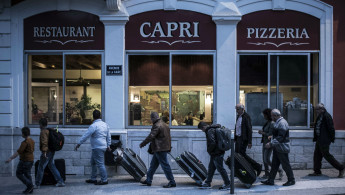The Hungarian people-smuggler who returned his fee to refugees
The Hungarian people-smuggler who returned his fee to refugees
Feature: An Iraqi refugee tells of a Hungarian smuggler who helped a group of refugees for a fee - but returned most of it to them.
4 min read
Many Iraqi refugees have reached Germany and France after a long journey [AFP]
France has begun distributing recent immigrants, whom it has allowed to stay, among its cities and towns. Dozens have been housed in youth hostels near Porte d'Italie metro station in the 13th arrondissement of Paris.
This is the first and necessary step that the refugees take before receiving asylum status and permanent residence permits and being able to reunite with their families - particularly for those who left their wives and children behind in their home countries or in different countries along the way.
Asylum seekers are not only Syrians. There are also Iraqis among them, for example. Mohammad is one of them.
"I am Iraqi from Anbar, but I'm also Syrian, as the diaspora and exile unites us," he said. "We left together from Turkey to Greece, then to Macedonia, the Czech Republic and Austria, before reaching Germany - and here we are today in France."
These refugees paint a bleak picture of Turkey, where Syrian, Iraqi and Turkish people-smugglers operate a cruel and greedy trade. They are said to receive between $1,250 and $1,500 for each person that they transfer by sea, without thinking of the lives they put at risk.
"They brought two boats that [crammed on] nearly 133 people, not counting children," said Mohammad.
"When we jostled to find a place on the boat, my son, who hadn't reached the age of four, drowned and died with 32 others. That was the worst day of our lives."
Mohammad's son was a similar age to Aylan Kurdi, the child whose lifeless body so recently featured in photographs shared by the world's media.
| I am Iraqi from Anbar, but I'm also Syrian, as the diaspora and exile unites us - Mohammad, refugee |
"When we reached the Greek islands we faced even worse conditions," Mohammad continued.
"After the waiting and the suffering, we reached Athens. The journey from there to the Macedonian border took place in better conditions, but we didn't even receive one bottle of water. In Macedonia, the situation changed. We were met by nongovernmental organisations who offered us food and drink.
"We were 500 people, so they booked seats for us on a train and we paid 10 euros ($11.30) each. We crossed the Serbian border and reached the capital, Belgrade, before heading to the Hungarian borders. We did not imagine Hungary would be so cruel."
In Macedonia, Mohammad's group, which consisted of 34 Iraqis and a Syrian, met a Hungarian who asked each of them - apart from the children - for 250 euros ($285) to help them cross to Hungary. Mohammad called this man "the noblest smuggler".
| When he became aware that two families among us did not possess anything, he gave each one of them 500 Euros - Mohammad: An Iraqi refugee |
The Hungarian walked with the group for an hour to the Macedonia-Hungary border and cut the border fence and helped them all cross to the other side.
"I can't forget what he did," Mohammad continued. "He had made 8,000 Euros ($9070) out of this deal, but when he became aware that two families among us did not possess anything, he gave each member of the family 500 euros and returned 50 euros to each of the rest of us.
"In the end, he only made 1,500 euros ($1,700) after paying transport costs and distributing the rest," Mohammad said.
"After a journey of 170 kilometres by car, we arrived at a railway station to take a train to Austria. We paid 35 euros ($40) for each ticket. We were not offered anything - not even a glass of water - at the station or in the whole of Hungary," Mohammad remembered.
He said that he will never forget the bad way the Hungarian authorities had treated them: "It is not similar at all to what that noble smuggler had done."
Mohammad said that he saw "the bodies of refugees lying among the trees after smugglers had disposed of them, and many had been robbed".
Mohammad said that things were different when they reached an Austrian railway station: "Here, everything was different. They received us with embraces and offered us food, drink, clothes, shoes, toys for the children and more."
From there, they took a train to Munich in Germany where "the reception was good and they were very generous and even gave us medical examinations", according to Mohammad.
In Munich, after a long journey, Mohammad said that they were offered to continue their journey to France: "We were told conditions there were better and receiving asylum [status] was quicker, in less than two months, and that we would be able to reunite with our families. My wife is still in Baghdad with our other three children."
After 13 hours on a bus, they reached the French capital, Paris.
Mohammad expressed his anger and dismay at the Arab press. "The Western press looked for and cared for us, while the Arab press did not."



